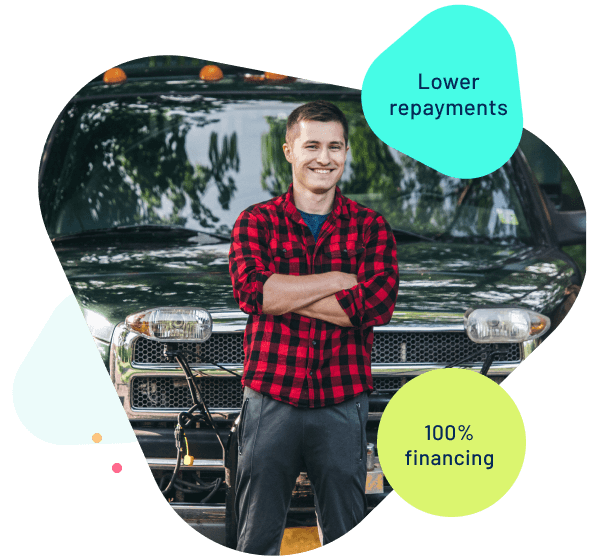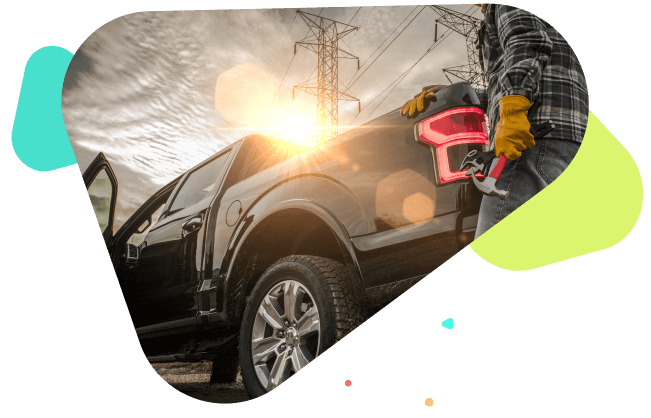Yes, with a traditional chattel mortgage, the interest component of payment is tax deductible and the business can claim depreciation deductions on the equipment.
What is equipment financing?
Many firms borrow money to acquire new equipment, from trucks to farm equipment and everything in between. By borrowing money, you can can preserve your precious cash reserves and pay back the cost of the equipment out of its revenues over time.
Just like a vehicle loan or property mortgage, a business equipment loan is secured against the value of the asset you want to buy.
What are your alternatives?
Chattel Mortgage
This is a traditional type of business vehicle loan where the lender gives you money to buy something and then holds that item as collateral in case you don't pay back the loan (just like a residential mortgage).
Chattel mortgages are the most popular ways to finance new equipment. This is because they allow you to own the piece of equipment immediately, so you are not restricted in how you use it (as you would be with a hire purchase agreement).
The equipment also serves as the only form of security for the loan, leaving your other assets debt-free.
Chattel mortgages and equipment loans also allow you to claim GST input credit in full at the time of purchase.
Compared to other financing methods, chattel mortgages require less documentation; work with other loans; require no extra collateral and provide immediate ownership.
Equipment Lease
With a lease, you don't own the equipment you're using. Instead, by paying a regular rental charge to the lender, you are leasing it from them (similar to renting an apartment).
At the end of the term, you may have the choice of purchasing the equipment at its depreciated value, extending the lease period, or returning the equipment, depending on the conditions of the arrangement with the lender.
In order to safeguard the asset's value for the lender, a lease agreement will include limitations and conditions on the asset's permitted uses. You may need to include these constraints into your operating procedures, or at the very least be aware of them.
With a lease, the amount you pay over the course of the lease is usually higher than the amount you would have paid upfront with a loan.
A conventional equipment leasing arrangement does not result in ownership of the equipment.
Some lenders may also require a lengthier minimum lease duration than you would choose. As a result, you can end up paying more for equipment than you would have planned to.
Hire Purchase
A hire purchase is an agreement where a contract is drawn up to acquire a piece of equipment from a lender over time.
Although you do not technically own the equipment while making payments, you do have the right to use it throughout the 'rental' period. Ownership of the piece of equipment is then transferred to you after the final payment is received.
While hire-purchase is a terrific approach to gradually acquire new equipment for your firm, keep in mind that the total cost of the hire-purchase agreement will be more than buying the equipment outright (since the finance provider needs to make a profit).
We can help you every step of the way.
Business financing is confusing unless you are an expert. There are many different options with distinct tax and cash-flow implications. Then there is the minefield of different requirements for different financiers. Our loan specialists will let you know your options, help you apply, and negotiate on your behalf. There are enough hassles in business - let us take care of one of them!
Expert Advice
Our experienced lending specialists can clearly explain your options and help you decide what is best for you.
Save money
We’ll find you the best possible deal from our wide range of reputable equipment financiers.
No hassles
Our simple process takes the hassle out of getting an equipment loan.
Fast approvals
We know exactly what our lenders require so we can get through to approval quickly.
What are the eligibility requirements for vehicle and equipment finance?
To secure an equipment loan, you must:
-
Be a tax resident of Australia. This means your business must be based in Australia, be registered here, and be operating here. You'll require an Australian business number (ABN) and must pay Australian taxes.
-
Make commercial use of the equipment. As part of the loan terms, you must use your equipment or business vehicle primarily for business purposes. As a result, you may be unable to lease or buy equipment that is unsuitable for your company.
-
Own a successful business. The financials of your organisation must show that it is profitable. As a result, you'll be able to demonstrate your ability to pay back your loan.
When applying for an equipment loan, you may be asked to provide the following information:
-
Statements of cash flow
-
Income and expense statements
-
Proof of ownership of the company (if applicable)
-
Car insurance proof
-
What kind of equipment are you looking to finance?
We can help you secure funding for:
-
Cars (passenger and light commercial)
-
Heavy transport vehicles such as trucks, trailers, and other vehicles
-
Coaches and buses
-
Farm equipment
-
Earthmoving equipment and yellow items
-
Material handling equipment such as forklifts, cranes, and other machinery
Apply for a CarLoans.com.au business equipment loan
CarLoans.com.au makes it simple to apply for an equipment loan.
Finding the lowest interest rates and arranging a loan has never been easier thanks to CarLoans.com.au. Our four-step procedure saves you time and gets you behind the wheel sooner.
-
Describe your requirements and apply online or over the phone.
-
We'll find you the best finance possible.
-
We'll handle the application and the settlement.
-
Start using your brand new business equipment!

Frequently asked questions
Arrange a Call
Fill out the following details and one of our car loan specialists will be in contact.
